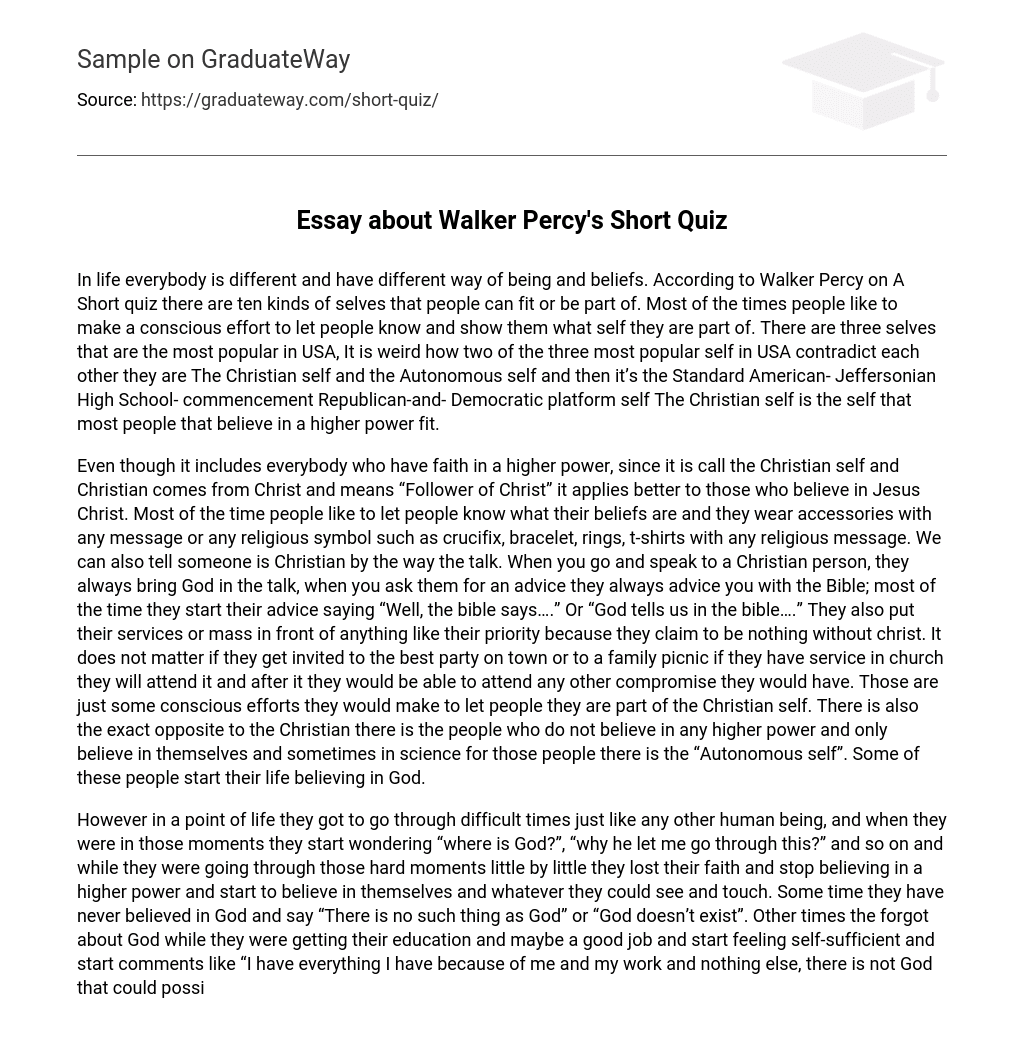In life, individuals have their own unique identities and beliefs. According to Walker Percy’s “A Short Quiz,” there exist ten types of selves that individuals can align with. Often, people make a deliberate effort to disclose and demonstrate the self they associate with. In the United States, three selves are particularly prevalent, despite their conflicting natures. These include the Christian self and the Autonomous self, along with the Standard American-Jeffersonian High School-commencement Republican-and-Democratic platform self. The Christian self resonates with those who believe in a higher power.
The Christian self encompasses those who have faith in a higher power, specifically Jesus Christ. Many individuals openly express their beliefs through religious accessories and incorporate God into their conversations. Attending church is a top priority for Christians, as it demonstrates their affiliation with the Christian self. In contrast, the Autonomous self rejects belief in any higher power and relies solely on themselves or science. Some of these individuals may have once believed in God.
Despite experiencing difficult times, some individuals question the whereabouts of God and why they are faced with hardships. These periods of struggle gradually diminish their faith, causing them to lose belief in a higher power and rely solely on their own abilities and tangible aspects of life. Whether they never believed in God to begin with, declaring that there is no such entity, or temporarily forgetting about God while pursuing education and career growth, they develop a sense of self-sufficiency. Mocking Christians and advising them to abandon faith in favor of self-determination, these individuals claim that personal effort is the only driving force in life. Through such actions, they exemplify membership within the “Autonomous self” category.
One remarkable aspect of the United States is its people and their hospitality, helpfulness, and involvement in their communities. This sense of caring and unity is reflected in the name of the country: United States of America. There exists a specific group within this nation known as the “Standard American-Jeffersonian High School-Commencement Republican and Democratic platform self”. The individuals belonging to this group are enthusiastic about assisting others and actively participating in various aspects of their lives – be it at home, school, work, or their community. They willingly offer help without being prompted and are always prepared to lend a hand. Moreover, they actively engage with events such as elections, debates watching, and persuading others to vote for candidates whom they believe will benefit the country’s best interests. These qualities serve as only some indications for identifying members affiliated with the “Standard American-Jeffersonian High School-Commencement Republican-and Democratic platform self”.
In a brief quiz, Walker Percy presents ten different self-identifications that individuals can adopt. Among these, the three most prominent in American culture are: the Christian self, which encompasses those who have faith in a higher power, particularly Jesus Christ. Members of this group display their beliefs through clothing and items with Christian messages or symbolism, prioritize their religious commitments above all else, and frequently reference and offer guidance based on the Bible.
Another popular self in American culture is the Autonomous, which is the antithesis of the Christian self. It appeals to individuals who do not believe in any higher power and instead place faith solely in themselves. They express their beliefs by making comments that oppose God or by asserting their self-sufficiency and personal achievements. Occasionally, they ridicule those who have belief in a higher power. The Standard American-Jeffersonian High School-Commencement Republican-and Democratic platform self is also a popular self. It is favored by individuals who enjoy participating in and being involved in their surroundings.





